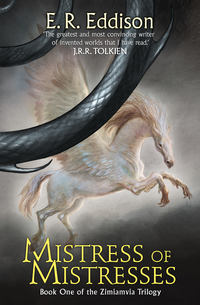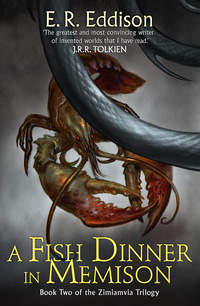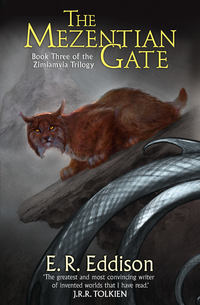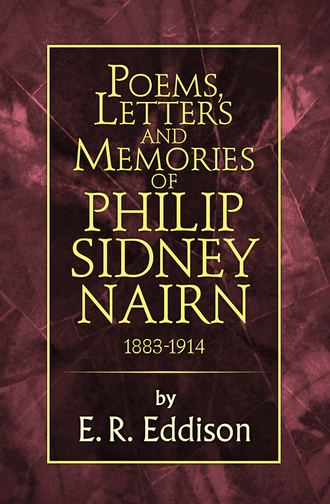
Полная версия
Poems, Letters and Memories of Philip Sidney Nairn
Trinity at this time was in danger of becoming a somewhat ‘cliquey’ college. It had, three or four years earlier, been rescued from a threatened anarchy of rowdyism by its new Dean, Mr Michael Furse, now Bishop of Pretoria; and a tendency had become apparent among a certain section of the undergraduates to look upon themselves as the peculiar guardians of the corporate welfare. Among the freshmen of the year 1901 there grew up a group of friends, including many of the scholars and one or two of the best rowing men and football players of the year, between whom and the just persons of the senior years there arose a degree of estrangement based, no doubt, on mutual misunderstanding. This lack of good fellowship was doubtless very silly, very unjust, very unnecessary on both sides, as plenty out of each camp have since discovered. It was pronounced, however, when Nairn came up in 1902.
It was in 1901, and among what I may call the Caesarean as opposed to the Pompeian party, that the exclusive and august body known as the A.C. was founded. There were, I think, five original members, and the membership never went far beyond this. The initials stood for ‘Alpine Club’, the object of the society being primarily climbing in and out of Trinity and other colleges in the small hours. To the jaundiced eye, however, of second-year virtue the letters signified ‘Alcoholic Club’. That the principles of the body were anti-alcoholic I am certainly not so hardy as to allege. Its memory is enshrined in the famous Mitre Cup, the existence of which is due to Mr Raper: a name that few Trinity men – not I, at least – can pronounce without a feeling of the warmest admiration and affection. The cup commemorates the unexplained appearance one morning in the Garden Quad at Trinity of a stone mitre, an architectural feature of St John’s College, and its equally unexplained disappearance and return to its age-long abode during the following night. Nairn was elected to the A.C. soon after becoming a member of the college, and took no mean share in some of its most successful enterprises. I think he was there when the President missed his hold in the dark on a certain fall-pipe high aloft on the ‘overland route’, and had to be extricated from Balliol with a sprained ankle by means of sheets let down from a first-floor window looking on to Trinity quad. Other incidents are mentioned in his letters. In 1904 he writes:
‘The Alpine Dinner was a vast success, and also the flash-light photo thereof, but — and —, with their accustomed celerity, have not yet sent it me. To solemnise the occasion we lit an enormous bonfire in the middle of the Parks, which created intense scandalismos, and an unfortunate rencontre with a copper, suspicious of our numbers and presence at 4 a.m.’
In 1906 he writes:
‘I suppose you saw all about l’affaire Maurice. It may interest you to hear that I wasn’t in it (though I damned nearly was). Most of Trinity and no small part of the ’Varsity still think I was, however. So that spurious notoriety is descending upon me in my reprobate old age.’ fn1
Whether the Club survived into later years or ended its existence with the going down of those who constituted it in its prime, history relates not, nor is it relevant to this narrative.
Though his particular friends were identified with what has been referred to as the Caesarean camp, Nairn was persona grata with all sections of the College. His membership of the Rugby fifteen and of several of the college literary and debating societies, such as the Griffin (the official debating society of Trinity) and the Gondoliers (founded originally for the study of Gilbertian opera, but extending its patronage to a much wider range of dramatic literature), kept him in touch with the more orthodox elements. But the chief reason lay in his sunny and sociable disposition, the power of which no one who came into contact with him could long resist. Even the inner camp of irreconcilables unbent towards Nairn. In later years chance brought him into close relationship and good fellowship with some of those from whom college cliquishness had divided him at Oxford.
If the fascination of pleasant memories has trapped me into dwelling on the more ‘unbuttoned’ side of the Oxford days, it must not be thought that he neglected their quieter gifts. He was a great reader, and no term or vacation passed without adding a number – sometimes a dozen, sometimes a score – of entries to the list he kept of books read: a long and catholic list, dating back to his preparatory school-days when he was only ten years of age. The short stories of Guy de Maupassant, Swinburne’s Poems and Ballads, Meredith’s Shaving of Shagpat, and various plays of Shakespeare and other Elizabethan dramatists were among his favourite books first read during his ’varsity days. Many of these we discovered jointly, and read aloud together: some at Trinity on lazy afternoons, others at Mrs Honey’s among the Borrowdale mountains. He possessed the accomplishment, very rare because never taught, of reading aloud well, without monotony or affectation; and it was equally delightful to listen to his rendering of the musical cadences of lyric poetry, or to his declamation, in a swashbucklering style that was peculiarly his own, of the thunder-charged dialogue of Edward II or The Duchess of Malfi.
His literary tastes and accomplishments are matter for a later chapter. The name of Borrowdale brings me to two vacations spent at the Lakes, in the springs of 1905 and 1906. Our headquarters were at Green Bank, a house standing back on the hillside behind the farm of High Lodore, half a mile or so from the head of Derwentwater and the same distance from the little hamlet of Grange and the Gates of Borrowdale. Here, fortified by the hospitality and good cheer of Mrs Honey, we put in four hours’ reading at our text-books each morning, supplemented by a less defined period in the evenings, and spent the rest of the day in exploring the high fells between Skiddaw and Scafell. The charm of the Lake mountains cast its spell on Nairn. He writes in 1909 from Kota Bharu:
‘I’ve been thinking of you in the tail-end of this year, up at Mrs Honey’s, when the vile tourists have left only their traces behind on the fells and visitors’ books, and one can roam unoffended in the solitudes. Jucundum fuerit! Even in a glorious country like this, with the mountains all round, and the distant forests blue on the hillsides, or sailing on the sea in an open boat by night, with the stars reflected in the waters, and a cool breeze swelling the big sail – no, there is no moment like that on the high fells when the mists swirl and lift, and the dales appear in the sunlight below.’
One expedition stands out clearly in my recollection. After our morning’s work we set out, with the traditional change of stockings and a toothbrush, to climb Gable and the Pillar, descending to Wastdale Head, where we were to spend the night, and return by way of Eskdale next day. It was late spring and snow lay on the high mountains; the wind had blown the ice on a post planted in the cairn on Gable into feathers some inches long. Breasting the ridge of Greyknotts we encountered a hail-storm that whipped our right cheeks to the hue of the rowan berry, and as the storm passed the clouds divided and revealed the Pillar, dark and wild against a white mist, the teeth and edges of his black crags picked out with snow, the sky leaden above him, and a rainbow thrown across cloud and hill. It was then, I think, that Nairn fell in love with the Pillar, which he considered the finest of the Lake mountains. We stood on the top of it at sunset, looking down to the vast bulk of the Pillar Stone and the shadowy depths of Ennerdale far below it, and westward to Ennerdale Water coloured with the sunset. It was dark by the time we had descended the abrupt grassy sweeps of the Black Sail, and we stumbled among many walls and stony water-courses before we reached the inn at Wastdale Head, where, since we had beards and no luggage and were plainly dirty, we felt ourselves something less than honoured guests.
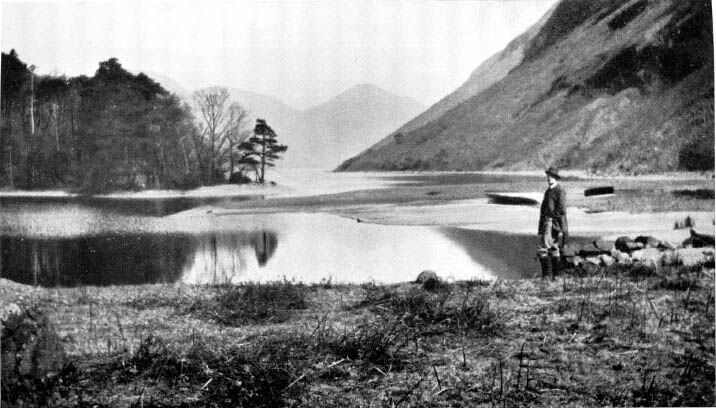
AT THE FOOT OF WASTWATER, APRIL 1906.
Next day, after visiting the foot of Wastwater, we crossed by Burnmoor Tarn to Eskdale, and after a substantial tea at the Woolpack Inn started up the dale at 4.45. After passing Esk Falls, where two streams join and above which is a steep ascent into the wilds of Upper Eskdale, we found ourselves driven more and more to the left, being unable to cross the beck, which was greatly swollen by rain. Foreseeing the approaching alternative of an ignominious return to the Woolpack or a night spent on the inhospitable flanks of Scafell, we finally leapt, not without risk, the steep and rocky watercourse and gained the higher levels of the valley, desolate and grand beneath the savage buttresses of Scafell and the Pikes. But the way was longer than we had reckoned; much time had been wasted in seeking a crossing-place; and we had to run a race with the daylight to ensure our finding the track on Esk Hause before dark. We sped like chamois (but scarcely with chamois’ speed or sureness of foot) along the huge and insecure boulders that cover the Eskdale slope of Esk Pike, halting at whiles to imbibe new energy from the brandy-flask, and reached Esk Hause as the deep crimson of the sunset was dying in the gap between Gable and the precipices of Great End, while Venus hung like a splendid jewel above it. The descent of Sty Head by starlight was slow. Once on the level we swung down the well-known road at five miles an hour. It was ten o’clock when we reached Mrs Honey’s. She had prepared roast duck, most succulent, for our supper. We ate it – I had almost said, the head with the legs and the appurtenances thereof. We slept a profound and dreamless sleep. Such feats can the digestion do in Borrowdale.
One day at Seathwaite, the little cluster of houses that lies highest in the main arm of Borrowdale on the way to Sty Head, we were late coming down from Bowfell: too late, in Nairn’s opinion, for tea. He was for pressing on to Rosthwaite and beer; I, mindful of the excellence of the tea at Seathwaite, was for tea first and beer afterwards. The tea was ordered, but Nairn refused to share it, sitting over against me while I ate and drank, and heaping opprobrium upon me in picturesque and lurid terms, much to the consternation of the farmer’s daughter. For drinking tea out of the saucer I was likened, with imprecations, to an old woman in a third-class railway refreshment-room. After tea we walked some few hundred paces in a thunderous silence (he told me afterwards that it was with difficulty that he refrained from striking me); then, at the same moment, we both burst out laughing, and there was peace again. Such and of such importance was this our most serious quarrel.
Other vacations he spent at home, or visiting friends, or travelling on the continent. In the Long Vacation of 1904, after staying up at Oxford for ‘Commem.’, the Alpine dinner, and Trinity ball, he spent six or seven weeks coaching a man for Smalls, and most of the rest of the time at Wimbledon, where he reported himself as ‘slaving away at History, but it is devilish hard working at home, with various attractions.’ He stayed with a friend at Seaview in the Isle of Wight for Cowes Week that summer. ‘As my friend has a small yacht,’ he wrote before going, ‘and is a bit of a mariner, as well as an old rowing blue (Oxon), I am rather fancying myself doing a slight Lipton touch.’ The following letter shows what he was doing in the Long of 1905:
‘LlNDISFARNE, ELM GROVE, WlMBLEDON.
‘August 3rd, 1905.
‘O Most Excellent One,
‘How much more excellent thou art than the unworthy writer of these lines, lo! thy two admirable but unanswered letters attest.
‘I really feel that I owe you some apology for not writing – especially after your excessive research in the matter of Swiss hotels. My Guvnor was thinking of going over there, but has changed his mind and is going to Brittany. However, I expect the information will be of use another year.
‘How went the viva? 1 am anxious to see the lists. I suppose you saw — staggered creation by taking a 3rd in law?
‘All my cubbing hopes and prospects have been cruelly dashed – it’s a way these things have. My French Marquis was already bagged, and a billet in Cumberland at — Hall, that seemed a snip, fizzled out at the last moment, as Lady — was too “broke” to afford such a luxury as myself. This was the real reason, the pretext being that her cubs were paying visits to friends.
‘Another billet in Somerset also “ran amok”, so I got bored and decided to go to Germany, and master (or at any rate acquaint myself superficially with) its uncouth Teutonic tongue.
‘By the bye, on the strength of my Gallic scion of the nobility it was reported in Wimbledon that I was going out to India as tutor with a young English Duke – “Sic fama volat et crescit eundo.”
‘I am starting for Germany – Frankfurt a/M. – on Monday via the Hook, and expect to stay there about seven weeks. I am going to friends – a very jolly old house – about three miles out, and as there will be a lot doing in Frankfurt (including myself) I ought to make things lively. My greatest pang is that, when last I went to Germany, I never set eyes on a girl whom I did not do my best to forget at once. Still, the gods may be kinder now.
‘By the bye, “She” is coming to stay in Oxford again in October – you will doubtless gather to whom I am referring, if you found me as unbearable about Eights Week as Ridley and other cold-blooded prosaics appear to have done.
‘However, enough of myself, e’er you are quite nauseated by my egotism. What are you going to do? How about the fair one in Paris?
‘By the bye, if you have not yet read Diana, do so at once – it is very fine. I am going to take several Meredith with me to read in Germany.
‘I have been working (more or less) for the past month, and playing tennis nearly every day, but am getting very bored with England and anxious to get away. I saw Jim Gilkison the other day. His people have taken a shooting up in Forfar, and he wants me to go up and shoot the wily grouse (or at any rate pose as your murderous sportsman), but I had to refuse as I shall not be back.
‘My address in Frankfurt will be: c/o Herr Bartmann-Lüdicke, Riederhöfe, Frankfurt a/M., in case you feel magnanimous enough to answer this letter.
‘Ever thine,
‘PHILIP NAIRN.’
The lady of Eights Week was more than a transient attraction. It were unprofitable, besides impertinent, to speculate on what might have been. She inspired the most perfect of his poems.
Three weeks later he writes from Frankfurt:
‘August 24th, 1905.
‘As you have, in a spirit of just retaliation, not deigned to answer the letter of your grovelling friend, I do myself the pain of writing to you yet again.
‘I am fairly well satisfied with Germany, there are many worse places. I got fairly well fed up by my journey here. I had eleven hours in the train feeling like a bottle of medicine, ‘ to be well shaken while being taken.’ This is a very jolly old house of twelfth century, with a ripping garden, about two miles out of Frankfurt. The Palmengarten here and the Opera are bully – I saw Verdi’s Aida the other night, well sung and staged. I should go every night if the Germans did not habitually turn in by 10 p.m., and we are out about three miles from the Operahaus. I was over at Homburg the other day, in the Taunus Mountains, no end of a flick place. Beauty is rare. However, I met a rather jolly girl yesterday, who is staying an hour’s walk from here across the country, and I find I can always learn a foreign tongue better from a pretty girl. Ireland is, however, in no danger. I am making vast progress in German, and shall be quite sorry to leave here, which I do in about a month. Where are you?
‘Ever yours,
‘P. S. N.’
The next two letters belong to the beginning of his fourth year, when most of his friends of the year senior to his own had gone down:
‘21, MICHAEL ST.
‘Friday, October 20th, 1905.
‘My Dear Old Man,
‘What the blazes can have happened to you? Where are you and what are you doing? Moreover, when are you taking your degree and why have you not written to me? Are you at Wren’s or are you in love?
‘These are just a few of the questions I should like answered.
‘Here I am in Oxford once more, where the cold is damnable, and the place deserted by most of those tried old friends whose footsteps resounded erstwhile on the paving of Cornmarket Street.
‘Pot and MacB. were here a day or two ago, previous to a three-months sojourn in Hanover – tomorrow I believe they are contemplating giving a 21ster (pray note the gibe) to the marine denizens of the North Sea.
‘Milly is reported due here tonight at 8.10.
‘Sid Field is reported assiduously polishing a high stool in a Leamington office. Duggy Graham is once more here (at Marcon’s Hall) and Maurice ably adorns the Presidential Chair.
‘The G— is married and H— (my God!) I still detest.
‘Ever yours,
‘PHILIP S. NAIRN.’
‘OXFORD UNION SOCIETY.
‘November 5th, 1905.
‘My Dear Herrick,
‘I am rejoiced to hear that we meet again at Philippi on the 9th inst. Can’t you make it more than a flying visit? Of course you understand that you will put up at the hotel – 21, Michael St – so many people drop in that we have had to christen the diggs “St Michael’s Hotel” – less charitable people may designate it – the pub.
‘I suppose you are working very hard; so am I. One H— don and I are at loggerheads, and from rather doubtful collections he is piling on the weekly tale of essays, in the idea that I am more ignorant than I should be – a year off schools. A sublime error on his part, except in the matter of constitutional history, which makes me inclined to spew up the little knowledge of it I possess.
‘P. is chucking slice-eating: a good thing for him, as he was acquiring fresh vices in Chichester – a most banausic spot, in which the only society to be found was in the local bars. He and W— are going in for the consular service. I am going to have a slap at the Egyptian Civil, but doubt whether I have any chance, as they will probably plough me over eyes.
‘Do you know Ernest Dowson’s poems? John Long has just brought out a new 5s. edition. I like his poems immensely.
‘I went with Duggy Graham to hear Yvette Guilbert last night. She is magnificent – if you have a chance, don’t fail to see her. I wish to heaven I could hear her sing that portion of her repertoire which I fear did not pass the Vice-Chancellor’s blue pencil.
‘Tonight I am going to the Ouds to hear one of the “Follies” at a smoking concert. I am going as my Twin’s guest. It is quite useful his being on the Ouds.
‘Ever yours,
‘P. S. N.’
Nairn, like most of his friends, worked prodigiously hard in the months preceding his schools, but he also kept up a wonderfully good average of reading both in term time and in the vacation for a man of such varied interests and so sought by, and seeking, society. It had been Dean Farrar’s wish that he should become a schoolmaster, a calling for which he considered him peculiarly fitted; and this was the career that Nairn had in mind when he came up to Oxford. In the event, however, his degree was not destined to prove a sufficiently brilliant one to give him the best start for an academic life. Moreover, he did not look forward to such a life with any lively pleasure. And so it was that some time before his History finals were in sight he was contemplating a preferable alternative in the Egyptian Civil Service, the posts in which were to be filled for the first time by a system of limited competition wherein mere ‘bookish theoric’ was to count for less than the qualities of leadership and savoir faire which he possessed in so marked a degree.
‘I am working like hell – eight hours a day,’ he writes early in 1906, ‘and also putting in for the Egyptian touch, but as there are about eighty applicants from either ‘Varsity and about twelve berths, the chances of success are not rosy. I spent a very merry ten days with the Fields at Leamington. The rest of the vac. I did about four hours a day.’
A little later he writes:
‘UNION SOCIETY, OXFORD.
‘Sunday, March 11th, 1906.
‘Dear Ric,
‘Thanks frightfully for your frequent letters. I’m sorry I have not answered them before.
‘I suppose you have fixed it up all right with Mrs Honey? I am looking forward to it very much. I go down to Pains wick (Glos.) on 17th, immediately after collections, to stop with Brucie for a few days, but I shall be home before 30th.
‘How goes it with you? Your letters tell me so little about yourself. H— and I are almost amicable
now, as I took a pure a on a collection of Stubbs’s Charters. We have two more at end of term, one on my Foreign Period, which I know, and the other on my Special Period, which it will take all the cunning I possess to survive, without betraying the fact that my knowledge of it, if not elementary, is still very superficial.
‘I have been rather North-Oxfording it this term: progressive bridge, whist, etc. Result – acquaintance with one really nice girl, but she, alas! has now departed for Portugal.
‘Adieu,
‘Yours ever,
‘P. S. N.
‘P.S. My application for E.C.S. is now awaiting consideration. Pray for me.’
Nairn did not obtain the Egyptian appointment. On coming down from Oxford, in order to occupy his time profitably and improve his knowledge of German, pending his entering on a definite career, he went, under an arrangement then in force between the British and the German Education Departments, as English master to the Schiller Gymnasium at Stettin in Prussia, where he was to learn German in exchange for English. Here he spent many pleasant months, and here as elsewhere he was popular with the professors and the students. The following extracts from his diary kept in 1907 give a picture of his life in Germany. They cover the last six weeks or so of his time there:
‘January 3rd. – Bundled out of the train [at Berlin] at 5.30 this morning feeling very sleepy. This wore off after a cup of coffee at the station. Drove to “Hotel Stadt London”, deposited my bag, and then explored Berlin in the half-light. Night was like day. Berlin life is continually looping the loop; it is like a cat chasing its own tail. Visited the market early. Very interesting. Then came back, shaved, dressed and washed. Saw the Schloss, Dom, statuary, and modern pictures before lunch, which I had “Unter den Linden” about 3. Later went to Café Opera: good music. Met a very decent German – travelled, and dressed in London – with whom I spoke for about two hours. Then went to Kleine Theatre, and saw Oscar Wilde’s “Idealer Gatte” very fairly well played – 150th time. Had supper “Unter den Linden” and then walked in Friedrich Strasse for some time. At about two turned in. Feeling tired.
‘January 4th. – Made a thundering good breakfast, and then armed with a map sallied forth to see the sights. In evening went to Winter Gardens – a huge music-hall with a starred room which made one feel one was à la belle étoile. Met a very decent American here, a full head taller than myself, an opera-singer anxious to learn German, very travelled, and the last ten years in Italy. Afterwards we went to the Westminster Café, excellent music. Then I had supper at Scandinavia, and eventually turned in about 3 a.m. In true British fashion the American and I never exchanged names, though we were together for about three hours.
‘January 5th. – Had my chocolate rather late. Then went to the Friedrich Museum, and saw the Dutch, Spanish, and Italian Masters, staying there till closing time at 3. A really grand collection. At about 4 I then lunched at the Luitpold Restaurant in the Friedrich Strasse.



